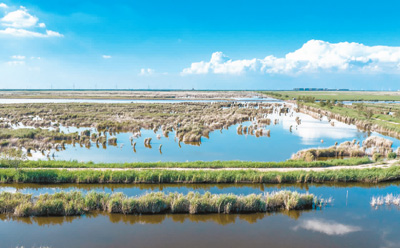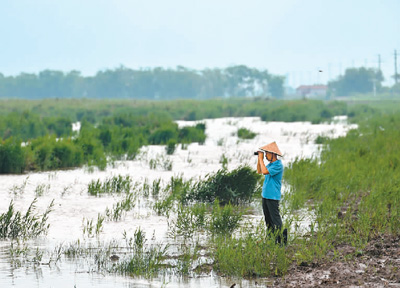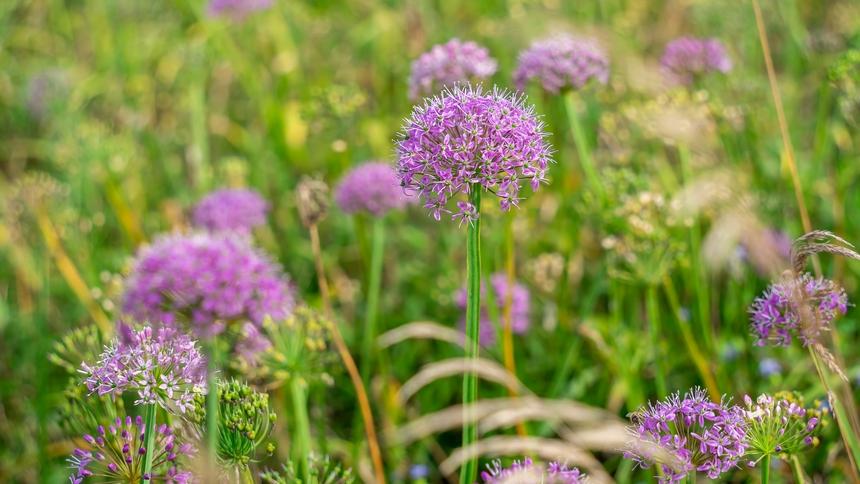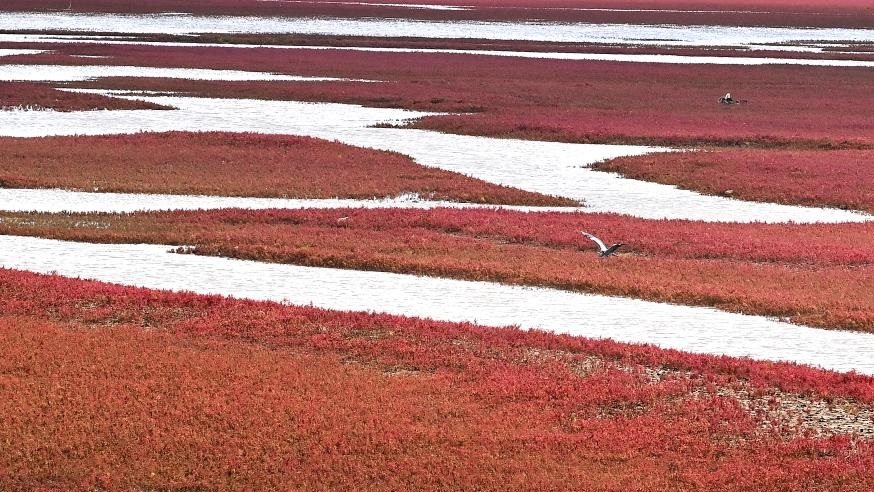North China wetland sees bird numbers soar after restoration
The Nandagang wetland in Cangzhou, north China's Hebei Province, was added to UNESCO's World Heritage List in July as part of the Migratory Bird Sanctuaries along the Coast of the Yellow Sea-Bohai Gulf of China (Phase II). This recognition highlights the wetland's improved ecology.

Photo shows the Nandagang wetland in Cangzhou city, north China's Hebei Province. (Photo/Yin Shi)
In recent years, the Nandagang Industrial Park, which includes the wetland, has implemented ecological protection and restoration projects, enhancing the wetland's ecology and ecosystem functions.
The Nandagang Wetland and Bird Nature Reserve Management Office reports that over 100,000 migratory birds were monitored in the wetland in 2023, a fourfold increase from about 20,000 in 2019.
The wetland, located on Bohai Bay's western shore, hosts 271 bird species, including 16 under first-class national protection and 52 under second-class protection, according to Wang Lijun, deputy director of the management office.
Established in 2002, the 7,500-hectare nature reserve includes a 3,814-hectare migratory bird habitat. The area is a crucial stopover and transit point along the East Asian-Australasian Flyway, one of the world's great flyways for migratory birds.
Prior to the reserve's establishment, much of the northern wetland had been converted to aquaculture ponds, negatively impacting its hydrology and ecosystems, said Meng Zhaolei, director of the management office.

A park ranger observes birds with his binoculars at the Nandagang wetland in Cangzhou city, north China's Hebei Province. (Photo/Yin Shi)
Cangzhou has since prioritized ecological conservation, implementing nature-based solutions and tailored protection and restoration programs for its wetlands.
In 2015, Cangzhou banned development in the wetland. This was followed by a comprehensive clean-up operation, which involved the removal of aquaculture operations and the relocation of over 170 livestock and poultry farms.
Between 2020 and 2021, the city restored 108.8 hectares of the northern wetland’s original ecosystem, consisting of water bodies, shallows and habitat islands.
"The project earned recognition from the Ministry of Natural Resources as a model case of marine ecological protection and restoration in 2023," said Wang.
Building on this momentum, the local government continued implementing protection and restoration efforts in 2023 and 2024. As a result, the city has prohibited aquaculture on 200 hectares of wetland, dredged 15.5 kilometers of waterways, and improved the ecology of 3,000 hectares of wetlands.
Today, water and soil quality in the treated areas of the wetland have seen significant improvements. The enhanced water environment and hydrological connections have improved the wetland's ecosystem stability and biodiversity.
This year, officials launched an ecological project to conserve and restore mountains, rivers, forests, farmland, lakes, grasslands and deserts. "This holistic approach aims to restore and protect the entire ecological chain of the region," Wang said.

A screen displays data from an integrated scientific monitoring platform at the Nandagang wetland in Cangzhou city, north China's Hebei Province. (Photo/Liu Hongrui)
"The comprehensive governance has led to improved water quality, resulting in a proliferation of aquatic organisms that provide ample food for birds. The restored wetland ecosystem is now more stable, capable of regulating the local climate and providing suitable conditions for birds," said Meng Derong, a professor from Cangzhou Normal University and an expert in wildlife rescue.
The city aims to restore another 386 hectares of land by December 2025, further enhancing the wetland's ecology while promoting sustainable development.
In 2021, the Nandagang Wetland and Bird Nature Reserve launched an integrated scientific monitoring platform, the first in Hebei Province to use AI-powered vocal and image recognition. Wang says it helps track bird species more accurately as part of the efforts to protect and restore this important wetland.
In addition to wild bird surveys, the platform assists with real-time monitoring of meteorological conditions, water temperature and hydrology, Wang said.
Photos
Related Stories
- Ecological environment of Ruoergai Wetland National Nature Reserve improved
- Scenery of Gahai Lake wetland in NW China's Gansu
- View of wetland park in E China's Shandong
- Chinese scientists research on protecting, restoring high-altitude wetlands
- Northwest China's wetland becomes migratory bird heaven
- China's Hanzhong strengthens ecological protection of Hanjiang River's source, wetlands
- Black-necked cranes breed babies in wetlands in Xainza County, China's Xizang
- Scenery of tidal flat wetland along Qiantang River in Hangzhou
- Desert wetland showcases environmental protection in Ningxia
- Zhejiang's national wetland park makes efforts to improve ecological environment
Copyright © 2024 People's Daily Online. All Rights Reserved.









